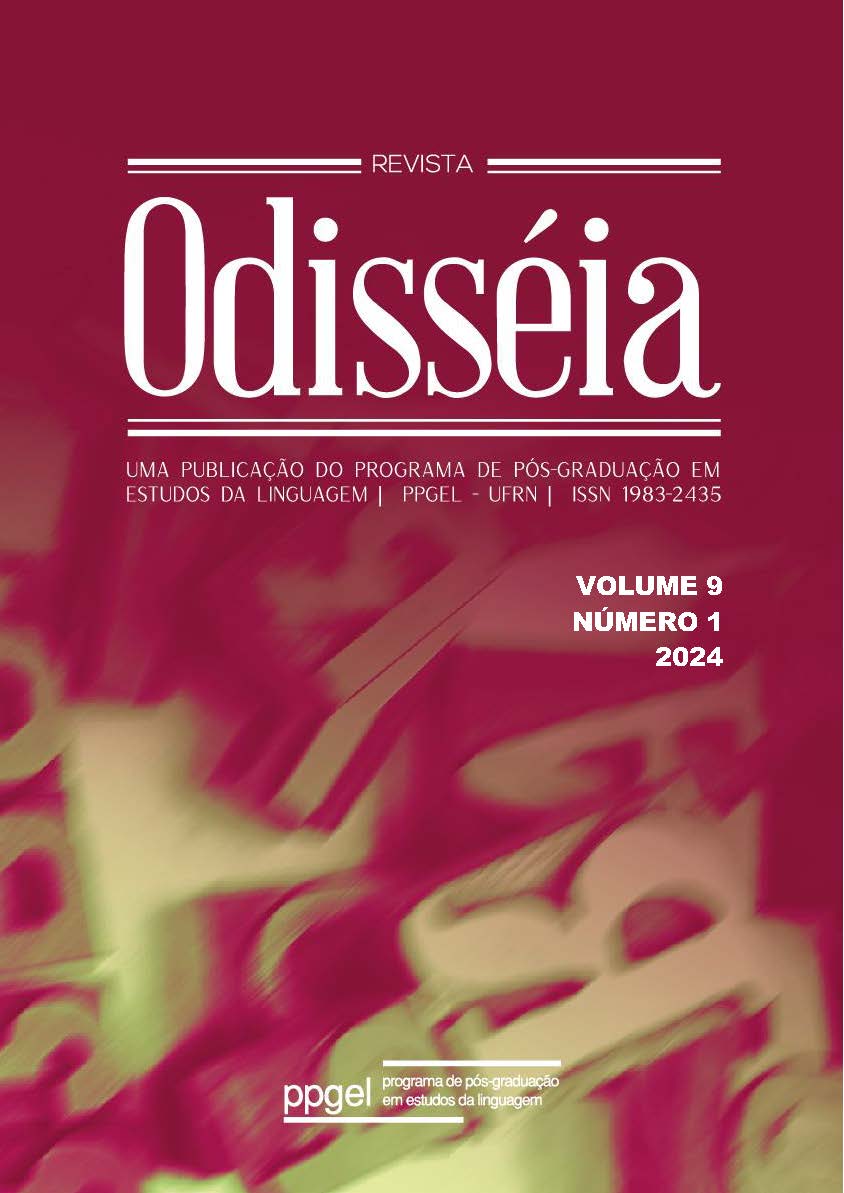Mixed-race Ophelia: postcolonial adaptation in the game Elsinore (Golden Glitch, 2019)
DOI:
https://doi.org/10.21680/1983-2435.2024v9n1ID32636Keywords:
Adaptation, Coloniality, Video Games, Literature, ShakespeareAbstract
This paper analyzes the game Elsinore, developed by the group Golden Glitch in 2019, as an example of a postcolonial adaptation of Shakespeare's literary classic Hamlet. Through the work of Hutcheon (2013) and Stam (2008), the paper argues that adapting goes beyond a supposed fidelity to the adapted text and can also be a political expression that highlights the perspectives of marginalized characters. In the game, the protagonist, Ophelia, is a young mixed-race noblewoman trapped in a time loop that the player must unravel. The analysis of Elsinore contributes to discussing issues of racialization and social belonging from the perspective of coloniality studies. In addition, it also helps to integrate these debates in the gaming context, thus contributing to adaptation studies. Finally, it concludes that Elsinore is a work that has aesthetic and political value. However, it still lacks deeper discussions about its value as a decolonial production.
Downloads
References
CANDIDO, Antonio. Literatura e Sociedade. 9. ed. Rio de Janeiro: Ouro Sobre Azul, 2006.
COWHIG, Ruth. Actors, Black and Tawny, in the role of Othello, — and their Critics. Theatre Research International, [s.l.], v. 4, n. 2, p. 133-146, fev. 1979. Cambridge University Press (CUP). http://dx.doi.org/10.1017/s0307883300000262. Disponível em: https://www.cambridge.org/core/journals/theatre-research-international/article/abs/actors-black-and-tawny-in-the-role-of-othello-and-their-critics/85626074928E644B17E9A5EC63BF931B. Acesso em: 16 jun. 2022.
DEFOE, Daniel. Robinson Crusoe. Tradução de Paulo Bacellar. 23. ed. Rio de Janeiro: Ediouro, 1970. (Coleção Elefante).
EGENFELDT-NIELSEN, Simon; SMITH, Jonas Heide; TOSCA, Susana Pajares. Understanding Video Games: the essential introduction. 3. ed. New York: Routledge, 2016.
FUREDI, Frank. How Sociology Imagined ‘Mixed Race’. In: PARKER, David; SONG, Miri (ed.). Rethinking ‘Mixed Race’. Londres: Pluto Press, 2001. Cap. 1. p. 23-41.
GOLDEN GLITCH. Elsinore [Jogo digital]. [s.l.]: Golden Glitch, 2019.
GROSFOGUEL, Ramón. Para descolonizar os estudos de economia política e os estudos pós-coloniais: transmodernidade, pensamento de fronteira e colonialidade global. Revista Crítica de Ciências Sociais, [s.l.], n. 80, p. 115-147, 1 mar. 2008. OpenEdition. http://dx.doi.org/10.4000/rccs.697. Disponível em: https://journals.openedition.org/rccs/697. Acesso em: 9 jun. 2022.
HALL, Stuart. Quando foi o Pós-Colonial? Pensando no limite. In: SOVIK, Liv (Org.). Da Diáspora: identidades e mediações culturais. Belo Horizonte: Ed. UFMG, 2003. p. 101-128.
HENNING, Vinícius Rutes. Quarto do Esquecimento. 2018. Disponível em: https://collection.eliterature.org/4/quarto-do-esquecimento. Acesso em: 22 jun. 2022.
HOOKS, Bell. Choosing the Margin as a Space of Radical Openness. Framework: The Journal of Cinema and Media, Londres, v. 36, n. 1, p. 15-23, jan. 1989. Disponível em: https://www.jstor.org/stable/44111660. Acesso em: 17 jun. 2022.
HUTCHEON, Linda. Uma teoria da adaptação. Tradução de André Cechinel. 2. ed. Florianópolis: Editora UFSC, 2013.
JESUS, Carolina Maria de. Quarto de despejo: diário de uma favelada. 10. ed. São Paulo: Ática, 2014. 200 p.
LOGAN, George M.; GREENBLATT, Stephen. The Sixteenth Century. In: GREENBLATT, Stephen; ABRAMS, M. H. (Org.). The Norton Anthology of English Literature. 8. ed. New York: W. W. Norton & Company, 2006, 1059 p.
MALDONADO-TORRES, Nelson. Outline of Ten Theses on Coloniality and Decoloniality. Frantz Fanon Fondation, 2016. Disponível em: http://fondation-frantzfanon.com/outline-of-ten-theses-on-coloniality-and-decoloniality/. Acesso em: 9. jun. 2022.
MUNANGA, Kabengele. Rediscutindo a Mestiçagem no Brasil: identidade nacional versus identidade negra. Petrópolis: Vozes, 1999. 140 p. (Coleção Identidade Brasileira).
SAID, Edward. Cultura e Imperialismo. São Paulo: Companhia das Letras, 2011.
STAM, Robert. A literatura através do cinema: realismo, magia e a arte da adaptação. Tradução de Marie-Anne Kremer e Gláucia Renate Gonçalves. Belo Horizonte: Editora UFMG, 2008. 511 p.
STAM, Robert. Teoria e prática da adaptação: da fidelidade à intertextualidade. Ilha do Desterro: a journal of english language, literatures in english and cultural studies, [s.l.], n. 51, p. 19-53, 30 abr. 2006. Universidade Federal de Santa Catarina (UFSC). http://dx.doi.org/10.5007/2175-8026.2006n51p19. Disponível em: https://periodicos.ufsc.br/index.php/desterro/article/view/2175-8026.2006n51p19. Acesso em: 27 maio 2022.
TIBURI, Márcia. Ofélia morta: do discurso à imagem. Revista Estudos Feministas, [s.l.], v. 18, n. 2, p.301-318, ago. 2010. FapUNIFESP (SciELO). http://dx.doi.org/10.1590/s0104-026x2010000200002. Disponível em: https://periodicos.ufsc.br/index.php/ref/article/view/S0104-026X2010000200002. Acesso em: 24 dez. 2019.
TIZARD, Barbara; PHOENIX, Ann. Black, White or Mixed Race? Race and racism in the lives of young people of mixed parentage. Londres: Routledge, 2005. 264 p.
Downloads
Published
How to Cite
Issue
Section
License
Copyright (c) 2024 Odisseia

This work is licensed under a Creative Commons Attribution-NonCommercial-ShareAlike 4.0 International License.
Thisa work has been licensed under Creative Commons - Atribuição - NãoComercial - CompartilhaIgual 3.0 Não Adaptada.


















